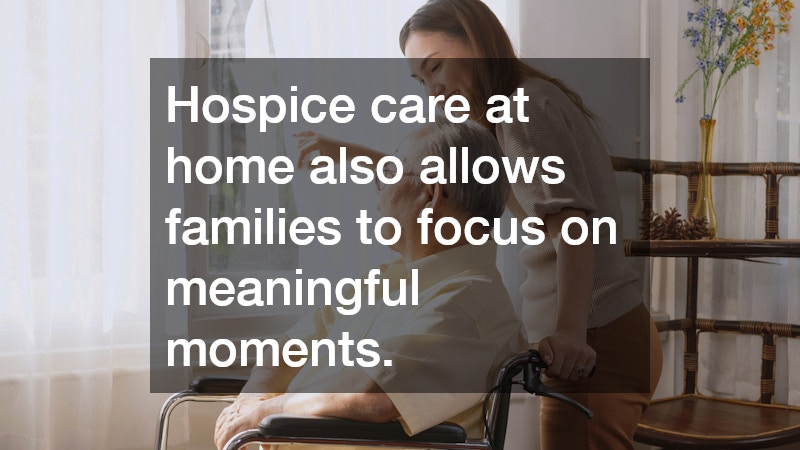When a loved one is facing a serious illness or nearing the end of life, families are often faced with difficult decisions about care. One option that has gained popularity is hospice care at home. This approach allows patients to receive compassionate, professional care in the comfort and familiarity of their own surroundings. Understanding how hospice care works, what to expect, and how to prepare can help families make informed choices and provide the best possible support for their loved ones.
What Is Hospice Care at Home?
Hospice care at home is specialized care focused on improving the quality of life for individuals with terminal illnesses. Unlike traditional medical treatments aimed at curing disease, hospice care prioritizes comfort, dignity, and emotional support.
Healthcare professionals work with families to manage pain, address symptoms, and provide emotional and spiritual guidance.
Home hospice services typically involve a team of nurses, doctors, social workers, counselors, and volunteers who collaborate to create a personalized care plan. This team not only attends to the patient’s medical needs but also offers guidance to family members on caregiving, emotional support, and end-of-life decision-making. The goal is to allow patients to spend their remaining time in a familiar environment surrounded by loved ones, rather than in a hospital or nursing facility.
Benefits of Choosing Hospice Care at Home
There are several key advantages to hospice care at home. First, it allows patients to maintain a sense of normalcy by staying in their own surroundings. Familiar routines, favorite personal items, and the presence of family and friends can significantly reduce stress and anxiety.
Second, home hospice care promotes individualized attention. Since the care team focuses on a smaller, personalized environment, patients often receive more one-on-one time with nurses and caregivers. This tailored approach helps manage pain and symptoms more effectively than a general care facility might.
Finally, hospice care at home supports the family. Caregivers receive training on daily care tasks, guidance on how to handle emergencies, and emotional support to navigate the challenges of end-of-life care. Many families report feeling more confident and less isolated when receiving professional support at home.
How to Prepare for Hospice Care at Home
Preparing for hospice care at home involves both practical and emotional considerations. First, families should designate a comfortable, accessible space for the patient. This may include arranging the bedroom to accommodate medical equipment, ensuring safety measures like grab bars or non-slip mats, and creating a calming environment with familiar items.
Next, it is important to establish a clear schedule with the hospice team. Understanding who will visit and when—whether nurses, aides, or volunteers—helps family members plan their own routines and reduces stress. Families should also keep an updated list of medications, medical history, and any specific care instructions, as this information will help the hospice team provide the best care possible.
Emotional preparation is equally important. Hospice care at home can be both rewarding and challenging. Families may experience a range of emotions, from relief and gratitude to anxiety and sadness. Open communication among family members and with the hospice team can help address fears and ensure that everyone feels supported.
What Families Can Expect During Home Hospice Care
Once hospice care at home begins, families can expect regular visits from healthcare professionals who monitor the patient’s condition and adjust care plans as needed. Nurses may administer medications, manage pain, and educate caregivers on daily tasks. Social workers provide counseling, help with practical concerns, and offer connections to community resources. Volunteers may provide companionship, respite care, or assistance with errands.
In addition to medical care, hospice teams often emphasize emotional and spiritual support. Families can request counseling sessions, support groups, or guidance from chaplains to help cope with grief, stress, and the complexities of end-of-life care. Communication between the family and hospice team is ongoing, ensuring that the patient’s needs and wishes are respected throughout the process.
Hospice care at home also allows families to focus on meaningful moments. Instead of concentrating solely on medical interventions, the emphasis is on quality time, creating memories, and providing comfort. This approach not only benefits the patient but also helps family members navigate the emotional journey with dignity and compassion.
Choosing hospice care at home can be a deeply personal and compassionate decision for families facing end-of-life challenges. By understanding what hospice care entails, recognizing its benefits, preparing the home environment, and knowing what to expect, families can provide meaningful support to their loved ones. Home hospice care offers comfort, dignity, and a sense of peace, allowing patients to spend their final days surrounded by love. With the right guidance and professional support, families can focus on creating meaningful moments while ensuring their loved one receives the highest quality of care in the place they call home.




